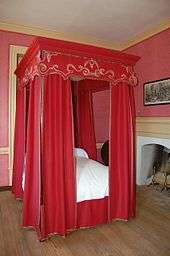Canopy bed

A canopy bed is a decorative bed somewhat similar to a four-poster bed. A typical canopy bed usually features posts at each of the four corners extending four feet high or more above the mattress. Ornate or decorative fabric is often draped across the upper space between the posts and a solid swath of cloth may create a ceiling, or canopy directly over the bed.
History
The canopy bed came into existence more for utilitarian means rather than for extravagance or decadence. Canopy beds with curtains that could completely enclose the bed were used by lords and noblemen in medieval Europe for warmth and privacy, as their attendants often slept in the same room. Until the 16th century, these beds, even those of the nobles, were fairly plain and understated. During this period, carved work on the headboard and posts became popular and more ornate canopy beds followed.
In pre-Republican China, until 1911, the family's canopy bed was the most important piece of household furniture, and often part of the bride's dowry. As signifiers of status, these beds were often intricately decorated with auspicious motifs, particularly relating to fertility, longevity and a happy marital union.[1]
Modern canopy beds

Today’s canopy beds generally fit into one of two categories: traditional or contemporary. Most of the traditional canopy beds have a Victorian aesthetic, with either metal rod frames or intricately carved wood frames and posts. These throwbacks also often feature ruffled, pleated elaborate draping, sometimes with rather heavy cloth. In contrast, contemporary canopy beds generally employ a simpler design. Wood, metal, or a combination of the two is used in the construction of modern canopy beds, which usually have little to no detail on the foot and headboards and often feature sharp, geometric designs.
The individual parts of modern canopy beds are called as follows:
- Bed frame: A typical metal frame that supports the mattress and box spring independent of the headboard or footboard. [2]
- Bedposts: Both head posts and foot posts are vertical posts placed on either side of the headboard and footboard that extend from the floor to the top of the headboard, footboard, or canopy.[2]
- Bed rails: Wood or metal rails that rest on top of and between the two side rails in order to support a mattress and box spring.[2]
- Canopy: A framed rooflike structure suspended over a bed by the bed rails.[2]
- Casters: Wheels attached to a bedpost or feet.[2]
- Center supports: Additional feet or leg supports placed underneath the bed rails to provide additional support at the center for a large mattress or split box spring.[2]
- Crown (also Canopy crown): The apex of a raised canopy.[2]
- Finials: Decorative end caps for the bed posts, used to hold a canopy in place.[2]
- Footboard: The solid or upholstered secondary focal point of a bed attached at or to the foot of the bed.[2]
- Foot: The portion of the bed at your feet--the foot of the bed usually faces out into the room.[2]
- Head: The portion of the bed that you lay your head on. It is usually the anchor of the bed and is placed against a wall or focal point.[2]
- Headboard: The solid or upholstered focal point of a bed attached at or to the head of the bed.[2]
- Platform: A boxed based for a mattress and sometimes a box spring and mattress.[2]
- Risers: Extensions made to raise a bed frame to add height to the bed.[2]
- Side rails: The support rails that anchor the headboard of the bed to the footboard.[2]
See also
References
| Wikimedia Commons has media related to Canopy beds. |
| ||||||||||||||||||||||||||||||